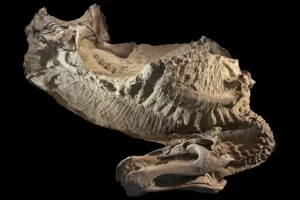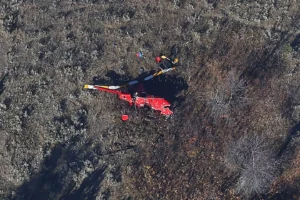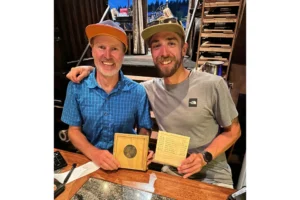Aunt of Teen Murder Victim Finds Peace Through Forgiveness
After years of hating Thomas Rivera, Sherry Myrick eases pain by letting go of anger
- Published In: Other News & Features
- Last Updated: Jan 02, 2024

Thomas Rivera, 45, holds the Superman blanket he's had since childhood in his art studio in Cheyenne. (Wyoming Truth photo by Jennifer Kocher)
By Jennifer Kocher
Special to the Wyoming Truth
CHEYENNE, Wyo.–They both carry heavy burdens: Thomas Rivera for the life he took; Sherry Myrick for forgiving him.
At 45, Rivera no longer recognizes the 17-year-old boy who killed his classmate over a girl.
Perched on a swivel chair in his parents’ Cheyenne home, Rivera hunched over a sketchpad that features drawings of an animated boy who will become the protagonist of his in-progress children’s book. Images of Spiderman, Rivera’s favorite superhero, dominate the room’s shelves and walls.
Rivera’s book is a light-hearted tale, created with the help of two fellow inmates, about the importance of following rules and avoiding the “monster way.”
The message resonates with Rivera. He knows firsthand the cost of succumbing to one’s weaknesses. In 1996, Rivera fatally shot 18-year-old Jeremy Kragness in Cheyenne. He received a life sentence, but only spent 26 years in prison due to a 2012 U.S. Supreme Court ruling that declared mandatory life sentences for teens unconstitutional after a 25-year minimum.
Today, Rivera works as a freelance artist and apprentice in a tattoo shop, while trying to rebuild his life. He owes his freedom, in part, to Sherry Myrick, Kragness’ aunt, who forgave him. It came with a personal cost: None of her five siblings speak to her, with the exception of Kragness’ mother, Kathy. Despite the family rift, not forgiving was even worse for Myrick, who for decades let her anger rip apart her life.

Rivera and Myrick are united in partnership through the victim offender dialogue (VOD) mediation process that brings surviving victims and family members face-to-face with their offenders for the purpose of healing.
Ripple effect
Rivera has been technically free for 18 months, but he still carries the weight of his crime. Not a day passes when he doesn’t think about what Kragness might have done with his life, he said. Everything sets him off, even a television commercial for a coffee creamer in which a mother hugs her son.
“I think of Jeremy and his mom,” Rivera said. “And for the rest of the day, it just it eats me up inside.”
It took Rivera six years in prison – with the help of dogged social worker David Dingman – to deconstruct why he shot Kragness. In the end, he described himself as an angry kid who fell short at everything. Though he had a great childhood, it ended when puberty hit and his male classmates became stronger and more athletic, he said. Even Rivera’s artistic talent seemed to pale in comparison to that of his classmates.
“I pretty much gave up,” he said. “I didn’t like myself. I didn’t like the way I looked. I felt like I had no value.”
Rivera kept these feelings to himself. Eventually, he started acting out, and ultimately, shot Kragness. It got worse in a maximum-security prison, where, as a 17-year-old, Rivera tried to prove himself. Two years into his sentence, he tried to kill himself by attempting to escape across the barbed-wire prison fence.
Eventually, Rivera met Dingman, who encouraged him to participate in restorative justice prison programs. He wasn’t interested at first, but he took part in a map project in 2003 and created a Wyoming historic and topographical map for students at Rawlins Middle School.
It was a life-altering experience. “. . . I felt like I had value,” Rivera said. “I felt like I could offer something.”
Rivera went on to participate in other prison-related projects, like a fundraiser for Hurricane Katrina victims and dialogues with students who visited the prison. He continues to share his story. Rivera has delivered 12 presentations at the University of Wyoming and through Recover Wyoming and Openings, LLC, rehab center in the hope of helping others.
“I am indebted to the people who have given me a chance,” he said.

Letting go
Myrick, now 60 and a part-time caregiver in Colorado, harbored hatred for Rivera for decades. She even said so during the trial. Kragness, the beloved first grandchild, was gentle and kind, with a silly side, she said. He often jumped out of the bushes to scare her.
“It never got old for him,” she said. “He would laugh and laugh.”
Myrick recalled a conversation with Kragness about Rivera’s desire to fight him over his girlfriend. She suggested they punch it out—and then shake hands and get on with their lives. Kragness preferred to talk it out with Rivera instead.
After her nephew’s death, Myrick turned to drugs and alcohol until her life spiraled out of control. None of the family wanted anything to do with Rivera, but Myrick attended his parole hearings. She expressed her hatred, begging the board not to let him go free.
Finally, at Rivera’s 2015 parole hearing, something in Myrick broke. Having watched the movie “Pay it Forward” and read the book “The Shack,” she felt the impact of their message of forgiveness. She blurted out to Randi Losalu, her victim advocate, that she wanted to meet Rivera.
Losalu, then with the Wyoming Parole Board, offered to arrange the meeting. Beforehand, Myrick was so nervous that she walked out of the hotel wearing two different shoes. Her resolve softened when Rivera entered the room, not as the tattooed punk she expected, but as a contrite middle-aged man.
“I told him to not be afraid to look at me,” she recalled. “I said that no matter what he said to me today, I would leave there forgiving him.”
The two prayed and hugged at the end of the visit. Myrick’s hate dissipated into a resolve to share her story of forgiveness. After that, the two spoke at a VOD meetings in Boise, Idaho, and Casper while Rivera was still incarcerated. She plans to join him in person to continue the dialogue.
“I hated being such an ugly person,” Myrick said, “and this has changed everything.”
Her grace is not lost on Rivera.
“I have to live not just for myself,” he said. “I have to always think about Jeremy and try to tell our story … to … try to save at least one life. I believe I owe that.”













